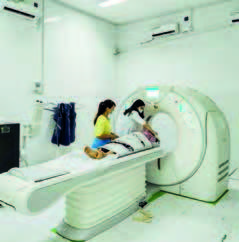By Dr Than Lwin Tun
According to one of the objectives of the Social Affairs of State Administration Council (SAC); “To elevate the Health and Sports sectors inclusive of all the people, improving the longevity and health of the nation”, the Ministry of Health, Myanmar, laid down the two objectives, to enable every citizen to attain full life expectancy and enjoy longevity of life, and to ensure that every citizen is free from diseases. To do that, the Ministry of Health is conducting super speciality medical care to the districts, states and regions.
The super speciality medical care plays a crucial role in providing patients with comprehensive and targeted treatment for a wide range of health conditions. It is also important in healthcare systems worldwide due to several significant factors. In this article, we would like to mention the significance of super-speciality medical care and how it contributes to the overall well-being of patients.
■ Expertise and Specialization: Super speciality medical care focuses on highly specialized areas of medicine, such as neurology, cardiology, oncology, etc. Physicians and healthcare providers in these fields undergo extensive training and gain deep expertise in diagnosing and treating complex medical conditions within their specialized domain.
■ Advanced Technology and Techniques: Super-speciality medical care often involves the use of cutting-edge medical technologies, equipment, and techniques. This includes advanced diagnostic tools like Magnetic Resonance Imaging (MRI), Computed Tomography (CT) scans, Position Emission Tomography (PET) scans and Ultrasonography (USG) as well as sophisticated surgical procedures such as robotic surgery, minimally invasive surgery, and organ transplants. These advancements can lead to better outcomes, shorter recovery times, and improved quality of life for patients.
■ Early Detection and Intervention: Speciality medical care plays a vital role in early detection and intervention for certain diseases. Specialists are trained to recognize subtle signs and symptoms of conditions within their area of expertise, enabling them to diagnose diseases in their early stages when treatment is most effective.
■ Complex and Rare Conditions: Super speciality medical care is typically sought for conditions that are complex, rare, or require highly specialized treatment approaches. Examples include certain types of cancers, neurological disorders, congenital heart defects, and rare genetic diseases. Super-speciality centres often have the expertise and resources needed to manage these challenging cases effectively.
■ Personalized Treatment Plan: It supports better equipped to develop personalized treatment plans tailored to the individual needs of each patient. They consider factors such as the patient’s medical history, genetic predispositions, lifestyle, and preferences when designing treatment strategies, leading to more effective and patient-centred care.
■ Multidisciplinary Approach: Many super-speciality medical centres employ a multidisciplinary approach to patient care. This means that healthcare providers from different specialities collaborate closely to develop comprehensive treatment plans tailored to each patient’s unique needs. This approach can lead to better coordination of care, improved communication among healthcare teams, and ultimately, better patient outcomes.
■ Improved Outcomes: Specialized medical care often leads to better health outcomes for patients. Specialists have a deeper understanding of particular diseases or conditions, allowing them to develop targeted treatment plans that may result in faster recovery times, reduced complications, and improved quality of life for patients.
■ Reduced Healthcare Cost: it can ultimately lead to cost savings by preventing complications, reducing hospital admissions, and improving overall health outcomes. By addressing medical issues early and effectively, speciality care can help mitigate the long-term financial burden associated with untreated or poorly managed conditions.
■ Research and Innovation: Super-speciality medical centres are often at the forefront of medical research and innovation. They conduct clinical trials, pioneer new treatments and therapies, and contribute to the advancement of medical knowledge in their respective fields. This continuous cycle of research and innovation drives improvements in patient care and helps address unmet medical needs.
■ Regional and Global Healthcare: Super speciality medical centres often serve as regional or even global healthcare hubs, attracting patients from across the country or around the world seeking specialized care. This can have significant economic implications for the region, as medical tourism brings in revenue from patients travelling for treatment, as well as opportunities for collaboration and knowledge exchange with international healthcare providers.
Meanwhile, the Ministry of Health conducted 15 times super speciality medical care during 2023 and eight times in 2024. The next super speciality medical care is planned to be conducted in the coming period.
In addition, super-speciality medical care is significant because it provides expertise, advanced technology, and specialized treatments for complex and rare conditions, employs a multidisciplinary approach to patient care, drives research and innovation, and serves as regional or global healthcare as well as drives advancements in medical knowledge and technology and reducing healthcare costs. Its availability and effectiveness contribute significantly to the overall health and well-being of the public.



